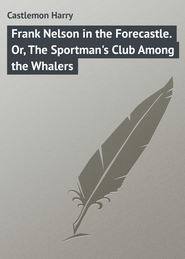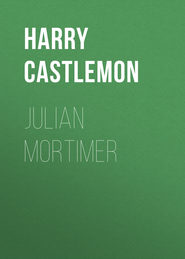По всем вопросам обращайтесь на: info@litportal.ru
(©) 2003-2025.
✖
A Rebellion in Dixie
Настройки чтения
Размер шрифта
Высота строк
Поля
Mr. Knight had evidently been thinking of this matter before for he appointed the committee without hesitation, and among them was the name of Mr. Sprague. They were all men who would not say a thing they did not mean, and as they were about to go out the president beckoned Mr. Sprague to his desk and placed a piece of paper in his hands.
“There’s some resolutions I drew up after thinking the matter over,” said he. “Perhaps it will serve as a model to you. You can amend them or leave them out entirely, as suits you best.”
When the committee had retired Mr. Knight got up, and for the next half-hour proceeded to arraign the Confederate States and praise the Union, his remarks calling forth loud and long-continued applause. He took the ground that it was a “geographical impossibility” to conquer Jones county, because, the inhabitants being lumbermen, it would be easy for them to slip into the woods, and when there nobody but a raftsman could find them. He kept his speech going until the committee were seen coming back. Mr. Sprague made his way to the desk, and amid the most impressive silence read the resolutions of secession as follows:
Whereas, The State of Mississippi has seen fit to withdraw from the Federal Union for reasons which appear justifiable;
And whereas, We, the citizens of Jones county, claim the same right, thinking our grievances are sufficient by reason of an unjust law passed by Congress of the Confederate States of America, forcing us to go to distant parts, etc., etc.;
Therefore be it resolved, That we sever the union heretofore existing between Jones county and the State of Mississippi, and proclaim our independence of said State and the Confederate States of America; and we solemnly call upon Almighty God to witness and bless such act.
When Mr. Sprague ceased reading, the applause which shook the building was long and loud. Not satisfied with that, some of the raftsmen fired off their guns, and for the next five or ten minutes it was impossible to do anything inside the church. By that time the excitement had somewhat died out, and then the president asked if there was any debate on the matter, but no one had anything to say. Knowing that those six men had the good of the county at heart, there was not one who had anything to say against them. Mr. Knight expressed himself pleased, and was about to announce that the resolutions were passed, when somebody on the outside of the building called out:
“Nathan, here’s a couple of rebels out here.”
“What are they doing out there?” asked the president, in surprise.
“I don’t know. They have just come up here. It looks to me like they were going to recruit.”
“Well, fetch them in here. Now, boys, not a word out of you. I will do the talking, and if you have any questions to ask, you can ask them; but don’t all talk at once.”
Mr. Knight settled back in his chair and the most profound silence ensued. Finally the crowd about the door gave way as the rebels and their escort approached, and the Confederates, seeing so many men standing there with their hats all off, courteously took off their own. They kept on until they got up to the desk, and then Mr. Knight drew up chairs for them to be seated.
“Now, gentlemen, what brought you up here?” asked the president.
“We came up here to recruit,” replied the ranking officer. “I am glad to see so many of you here, for it will save us the trouble of hunting you up.”
“Will you be kind enough to read that?” said Mr. Knight, unfolding the paper on which the resolutions were written and passing it over to the officer.
The official took the paper, and as he read his eyes opened with surprise. When he had got through with it he passed it over to his subordinate, and then turned and looked at the men near him. He was satisfied that there was not a man there who did not believe every word of those resolutions. The officer had nothing to fear now – he was the first recruiting official that ever came there – but after he got away he would not come back at any price.
“These are not all your men?” said he.
“No, sir. We have not more than three hundred men, but these extra parties have come in with their families at odd times. And every man you see is a Union man.”
“My friend, you are making a great mistake,” began the officer.
“We are ready to stand by it, sir.”
“Do you suppose the Confederates will stand by and allow you to take this county out of the State, to be an odd sheep in the flock?” continued the officer. “The first thing you know you will be overrun with men, and you won’t have a house to go into.”
“What will we be doing all that time?”
“Oh, I suppose you will fight, but it won’t do you any good. The Confederates can send twenty thousand men in here.”
“We don’t care if they send forty thousand,” replied the president. “Whatever you send we’ll fight.”
The men who were crowded in the church and gathered about the windows couldn’t stand it any longer. They broke out into loud applause, which continued for some minutes. When they got through, the officer evidently thought they were in earnest.
“We have a thousand men here, and when we get into the swamp we are willing to meet five thousand,” continued Mr. Knight. “You can’t conquer us.”
“What will you do for grub?”
“We’ll steal it,” shouted one of the men; and the answer was so droll and corresponded so entirely with the thoughts of the men who were standing around, that the whole assembly burst into laughter. Even the enrolling officers joined in.
“I suppose you can do that, of course,” said he, “but supposing the escort is too strong to be successfully attacked?”
“We don’t borrow any trouble on that score,” said Mr. Knight. “We haven’t got all the men we are going to have. You see how they are coming in now. But you are interrupting us, and we shall have to bid you good-bye. You see very plainly that you can’t raise any men here for the Confederate army. Another thing we’ll tell you, you are the first to come in, and you will be the last to go out.”
“Do you mean to say that you will kill any enrolling officers who come here?”
“That’s just what I mean to say. We don’t want them here.”
“Well,” said the official, rising to his feet, “we’ll go, but we won’t be the last officers to come in here. I will tell you that very plainly. You mustn’t think that the Confederates are going to allow you to have your own way in this matter. It beats anything I ever heard of.”
“We are aware of that, and that’s what makes us think we are going to go through with it. I will bid you good-bye, gentlemen.”
The men divided right and left to allow the rebels a chance to get out, and when they had passed out beyond the door the president proceeded to call the meeting to order.
“I am pleased with the way you obeyed my commands,” said Mr. Knight. “If you will obey as promptly as that, we are going to be hard to whip. The next thing is to elect a president.”
“I nominate Nathan Knight as president of the Jones County Confederacy,” shouted a man near the door.
“We ought to have a ballot for that,” said Mr. Knight.
“We don’t need no ballot. It takes too much time. Can I get a second to that?”
He could and he did. It seemed as if every man in the house seconded the motion. Mr. Sprague put the vote before the house, and it was carried unanimously. Mr. Knight did not stop to make a speech, but said the next vote would be for vice-president, and Mr. Sprague was nominated.
“Hold on, there,” shouted a voice. “We don’t want Mr. Sprague for vice-president. We want him for secretary of war. If there is any man who can put us fellows where we can do the most good in a fight Mr. Sprague is the chap.”
And so it was all through the convention. There wasn’t a ballot taken for anything, and no man thought of declining an office. By four o’clock the work was all done, and then Mr. Knight thought of something else.
“There is one thing more that I want the convention to decide on,” said he. “It is a ticklish piece of business, but we have got to do it. Jeff Davis has been making things very uncomfortable for our fellows out there in the Confederacy by telling them that they have got to light out or go into the army; now, what’s to hinder us from doing the same thing? There are many rebels about here – ”
“And I say let’s get rid of them,” said a voice. “I know one fellow who is going around all the time talking secession, and if the meeting says the word I’ll go to him and tell him he had better dig out. The county will be a heap happier if he ain’t in it.”
“Let’s all go in a body,” said another voice.
“That’s what I say,” said a chorus of half a dozen men.
“I think myself that would be the better way,” said the president. “If a lot of us get together and call upon a man, he will think we are in dead earnest. Give them time to take what they want, and then escort them out of the county. Don’t leave a rebel behind you. There being no further business, the convention stands adjourned, to meet again upon call.”
And where was Leon Sprague all this time? He was sitting in the front seat, where he could hear all that was going on. He felt proud when his father was elected secretary of war. He supposed, of course, that it was his business to post men in battle, but he learned better after a while. He was particularly anxious about escorting the rebels out of the county, and as soon as the convention adjourned he hurried out to find Tom Howe. As he was hurrying through the door, whom should he run against but Josiah – the “man who had seen a heap,” and who “got the best of half a dozen men.” He stood with his rifle hugged up close to him as if it were an old friend and he did not want to part from it.
CHAPTER III
“A WORD IN YOUR EAR.”











